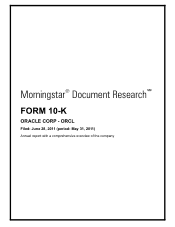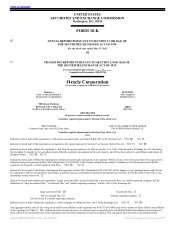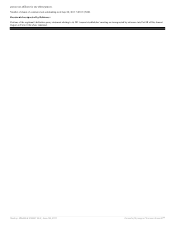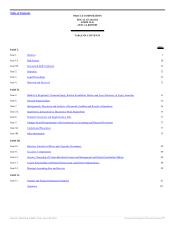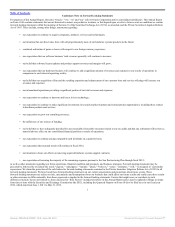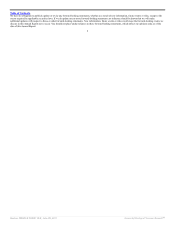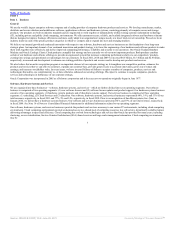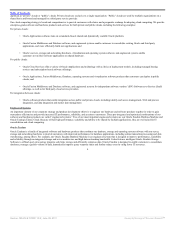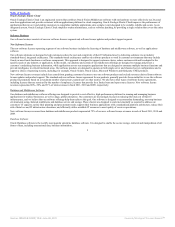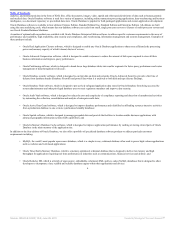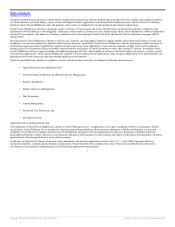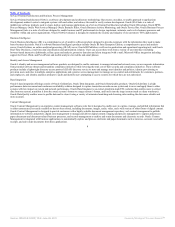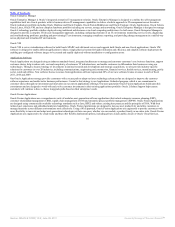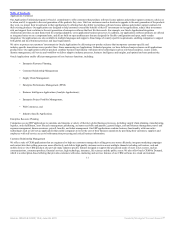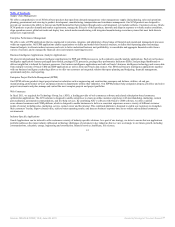Oracle 2010 Annual Report Download - page 8
Download and view the complete annual report
Please find page 8 of the 2010 Oracle annual report below. You can navigate through the pages in the report by either clicking on the pages listed below, or by using the keyword search tool below to find specific information within the annual report.
Table of Contents
deployed as “private” clouds or “public” clouds. Private clouds are exclusive to a single organization. “Public” clouds are used by multiple organizations on a
shared basis and hosted and managed by a third party service provider.
Our cloud computing strategy is broad and comprehensive to provide customers with choice and a pragmatic roadmap for adopting cloud computing. We provide
enterprise-grade software and hardware products and services for both private and public clouds, including the following examples:
For private clouds:
• Oracle Applications software runs on a standards-based, shared and dynamically scalable Oracle platform;
• Oracle Fusion Middleware and Database software, and engineered systems enable customers to consolidate existing Oracle and third party
applications, and more efficiently build new applications; and
• Oracle’s servers, storage and networking hardware, virtualization and operating system software, and engineered systems enable
customers to run their software applications on shared hardware.
For public clouds:
• Oracle Cloud Services offer a variety of Oracle Applications and technology with a choice of deployment models, including managed hosting
services and subscription-based software offerings;
• Oracle Applications, Fusion Middleware, Database, operating systems and virtualization software products that customers can deploy in public
clouds; and
• Oracle Fusion Middleware and Database software, and engineered systems for independent software vendors’ (ISV) Software-as-a-Service (SaaS)
offerings, as well as for third party cloud service providers.
For integration between clouds:
• Oracle software products that enable integration across public and private clouds, including identity and access management, SOA and process
integration, and data integration and master data management.
Engineered Systems
An important element of our corporate strategy and product development efforts is to engineer our hardware and software products together in order to gain
tremendous efficiencies and provide increased IT performance, reliability, and security to customers. These pre-integrated and optimized combinations of our
software and hardware products are called “engineered systems.” Two of our most important engineered systems are our Oracle Exadata Database Machine and
Oracle Exalogic Elastic Cloud. Because of their high performance, scalability and ability to be shared by multiple applications, they are well suited for IT
consolidation and cloud computing.
Oracle Exadata
Oracle Exadata is a family of integrated software and hardware products that combines our database, storage and operating system software with our server,
storage and networking hardware to provide customers with improved performance for database applications, including online transaction processing and data
warehousing, among others. For example, our Oracle Exadata Database Machine is an engineered system that is designed to improve performance, scalability
and reliability through an integrated storage and server architecture and high data networking bandwidth. It also features intelligent Oracle Exadata Storage
Software to offload query processing, integrate solid state storage and efficiently compress data. Oracle Exadata is designed to enable customers to consolidate
databases, manage a greater volume of data, dramatically improve query response times and further reduce costs by using fewer IT resources.
4
Source: ORACLE CORP, 10-K, June 28, 2011 Powered by Morningstar® Document Research℠

